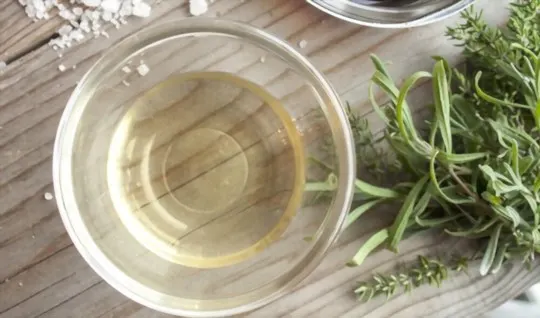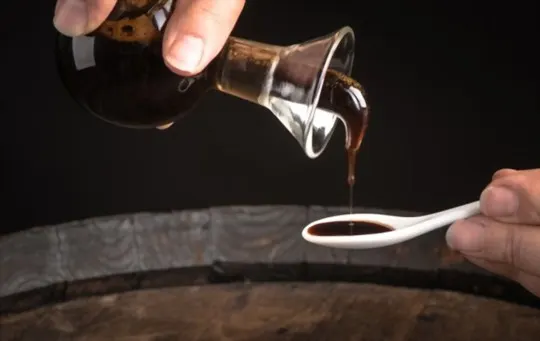Cane vinegar is a remarkable ingredient in both cuisine and home remedies, but what do you do when it’s nowhere to be found?
Don’t worry – these 7 substitutes for cane vinegar are just as effective and easy to find.
We’ll explore different types of vinegars with similar properties so that your recipes stay flavorful and your home remedies keep delivering on their healing potential.
Each option has nutritional benefits and unique flavors sure to match the needs of any recipe.
Let’s take a look at these best cane vinegar substitutes!
What’s Cane Vinegar?

Cane vinegar is a type of vinegar that’s made from cane sugar.
It has a dark color and a strong flavor.
Cane vinegar is popular in Asian cuisine, and it’s often used in marinades, sauces, and stir-fries.
Cane vinegar is made by crushing cane sugar and then fermenting it with water and bacteria.
The fermentation process converts the sugar into acetic acid, which gives cane vinegar its sour taste.
Cane vinegar has higher acidity than other types of vinegar, like apple cider vinegar or white vinegar.
The vinegar can be used in many different ways.
It’s often used as a marinade for meats or vegetables.
It can also be used to add flavor to sauces and stir-fries.
Cane vinegar can also be used as a cleaning agent because of its high acidity.
7 Best Cane Vinegar Substitutes
1. Apple Cider Vinegar

Apple cider vinegar is a type of vinegar made from fermented apples.
It has a sour, slightly sweet taste and is often used in salad dressings, marinades, and as a natural cleaning agent.
Apple cider vinegar can also be used as a cane vinegar substitute.
When substituting apple cider vinegar for cane vinegar, it’s important to keep the ratio of acidity the same.
This means that for every 1 cup (240 ml) of cane vinegar called for in a recipe, you should use 1 cup (240 ml) of apple cider vinegar.
Apple cider vinegar has a similar taste to cane vinegar but is slightly sweeter.
This sweetness can be offset by adding a pinch of sugar to your recipe if desired.
Apple cider vinegar can be used in the same ways as cane vinegar.
It’s great for salad dressings, marinades, and even cleaning.
When substituting apple cider vinegar for cane vinegar, just be sure to keep the ratio of acidity the same.
2. White Vinegar

White vinegar is a type of vinegar that is made from distilled alcohol.
It has a sharp, acidic taste and is often used in cooking as a flavoring or preservative.
White vinegar can also be used as a cleaning agent.
While white vinegar does not have the same flavor as cane vinegar, it can be used as a substitute in many recipes.
When substituting white vinegar for cane vinegar, use half the amount of white vinegar as you would cane vinegar.
For example, if a recipe calls for 1 cup of cane vinegar, use 1/2 cup of white vinegar instead.
If you are using white vinegar as a cleaning agent, it is important to remember that it is very strong and should be diluted with water before use.
3. Balsamic Vinegar

Balsamic vinegar is a dark, syrupy vinegar that originates from Italy.
It has a sweet, complex flavor that can range from mild to intense, depending on its age.
Balsamic vinegar is made from grape juice that has been cooked down and then aged in wooden barrels for a minimum of 12 years.
The taste of balsamic vinegar is both sweet and tart.
It can be used as a substitute for cane vinegar in many recipes.
When substituting balsamic vinegar for cane vinegar, it is important to keep in mind that the flavor will be more intense.
You may want to start by using less balsamic vinegar than the recipe calls for and then adjust to taste.
Balsamic vinegar can be used in salad dressings, marinades, and sauces.
It pairs well with fruits, vegetables, and meats.
If you’re looking for a unique flavor profile, try substituting balsamic vinegar for cane vinegar in your next dish.
4. Red Wine Vinegar

Red wine vinegar has a tart, acidic taste that can add a pop of flavor to salad dressings, marinades, and sauces.
It’s also a popular ingredient in French cuisine.
If you’re looking for a substitution for cane vinegar, red wine vinegar is a good option.
It has a similar tart, acidic taste that can enhance the flavor of many dishes.
To substitute red wine vinegar for cane vinegar, simply use an equal amount of vinegar in your recipe.
5. Rice Vinegar

Rice vinegar is a type of vinegar made from rice that has been fermented.
It is used in a variety of cuisines, including Chinese, Japanese, and Korean.
Rice vinegar has a milder flavor than other types of vinegar, such as cider vinegar or white vinegar.
Rice vinegar can be used as a substitute for cane vinegar.
When substituting rice vinegar for cane vinegar, it is best to use an equal amount.
However, you may want to start with less rice vinegar and then add more to taste.
6. Malt Vinegar

Malt vinegar is a dark brown vinegar that is made from malted barley.
It has a strong, pungent aroma and a slightly sweet flavor.
Malt vinegar can be used as a substitute for cane vinegar in many recipes.
It is slightly sweeter than cane vinegar, so you may want to adjust the amount of sugar in your recipe accordingly.
Malt vinegar can also be used in pickling recipes.
7. Champagne Vinegar
Champagne vinegar has a light, delicate flavor that is perfect for salads and other dishes where you don’t want the vinegar to be too overpowering.
It is also a great choice for making homemade vinaigrettes.
If you’re looking for a substitute for cane vinegar, champagne vinegar is a good option.
It has a similar light, acidic flavor that will work well in most recipes.
The main difference is that champagne vinegar is made from white grapes, while cane vinegar is made from red grapes.
To substitute champagne vinegar for cane vinegar, simply use an equal amount of vinegar in your recipe.
You may need to adjust the other ingredients slightly to account for the different acidity levels, but overall, the substitution should work well.
Conclusion
There you have it. These are the seven best substitutes for cane vinegar.
While they may not taste exactly the same, they will definitely get the job done in a pinch.
So next time you’re in a bind, don’t stress – just grab one of these substitutes, and you’ll be good to go.

7 Best Cane Vinegar Substitutes
Ingredients
- 1. Apple Cider Vinegar
- 2. White Vinegar
- 3. Balsamic Vinegar
- 4. Red Wine Vinegar
- 5. Rice Vinegar
- 6. Malt Vinegar
- 7. Champagne Vinegar
Instructions
- Select your favorite ingredient from the list above to use as a substitute.
- Follow the instructions and use the exact ratio of ingredients as directed.
- This will help to ensure that your dish turns out just as delicious as it would have with the original ingredient.

Carrie is a food writer and editor with more than 15 years of experience. She has worked for some of the biggest names in the food industry, including Bon Appétit, Food & Wine, and Martha Stewart Living.
As the Editor in Chief of IntroChicago.com, Carrie oversees all of the content on the site. She also manages the team of contributing writers and editors, who help to create delicious recipes, helpful tips, and informative articles that you’ll find on the site.
A native of the Chicago area, Carrie is passionate about all things food. She loves trying new restaurants and experimenting with new recipes in her kitchen. She’s also a graduate of the Culinary Institute of America, so she knows a thing or two about food!
